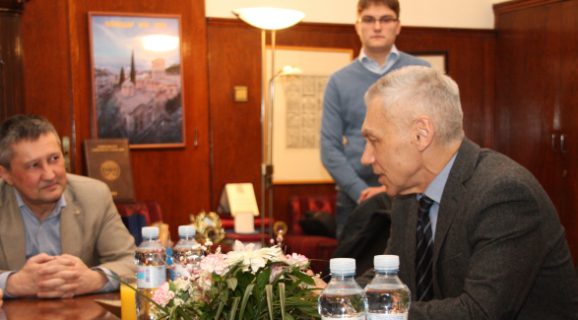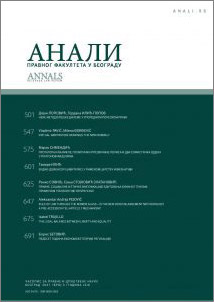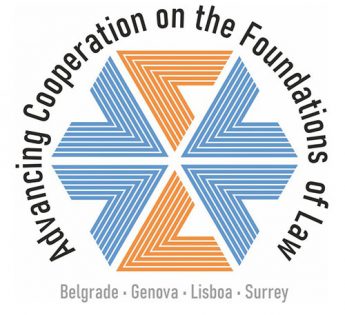
A Visit from the Ambassador of the Russian Federation, H.E. Alexander Botsan-Kharchenko
The Ambassador of the Russian Federation in the Republic of Serbia, Alexander Botsan-Kharchenko, visited our Faculty on January 29th, 2020, following an invitation of the Faculty of Law Student Club. The Ambassador first took a short tour of the Faculty in the company of our teachers and members of the Student Club, showing particular interest in the museum of the history of our Faculty and the commemorative plaque (displayed at the library) dedicated to the Russian professors who made a significant contribution to the work of the Faculty of Law in the interwar period. He then proceeded to a meeting with our Dean, Prof. Dr Zoran Mirković, the vice-deans and teachers, where they discussed Serbian-Russian relations and the cooperation between the University of Belgrade Faculty of Law and Russian universities.
After that, H.E. Botsan-Kharchenko gave a lecture at the “Slobodan Jovanović” hall, entitled: “Resolution 1244: Two Decades”. Our dean, Prof. Dr Mirković, provided an introduction. The lecture was attended by many teachers and students, but also by the members of the general public and the media.
Ambassador Botsan-Kharchenko pointed out that the Resolution 1244 was not perfect, but that it was the best solution under the given circumstances. In his opinion, the most important point of the Resolution is the fact that it guarantees the territorial integrity and sovereignty of the Republic of Serbia (previously the Federal Republic of Yugoslavia). He stressed that NATO did not “beat” the FRY in 1999, pointing out that a winner wouldn’t address the UN Security Council asking for a Resolution; instead, it was an attempt to find a compromise, since NATO came to realize they wouldn’t be able to invade the FRY by land. He particularly emphasized the fact that the world is becoming multipolar, and that the process is unstoppable.
The acts commited by the NATO in Kosovo and Metohija from 1999 onward were characterised by Botsan-Kharchenko as criminal; he stated that so many unlawful acts were commited against Serbia that it was practically impossible to discuss the matter of Kosovo and Metohija in legal terms. Speaking of the future handling of this issue, the Ambassador reiterated that Russia would support Serbia in any agreement with the Albanians which is in line with the Resolution 1244, as long as there were no external pressures in reaching it. He also mentioned that the Resolution 1244 allowed the Serbian army and police to return to Kosovo and Metohija. After the lecture, the Ambassador answered many questions from the audience.




